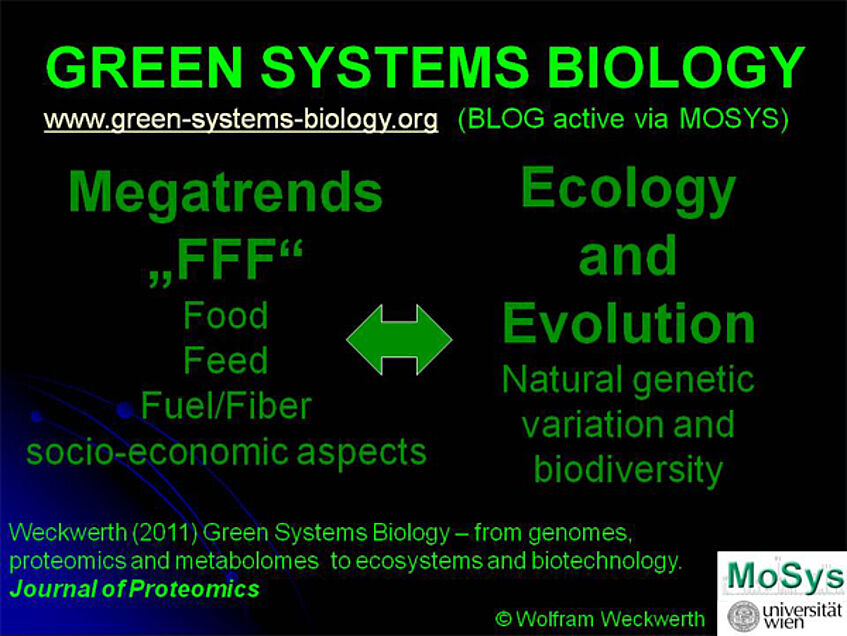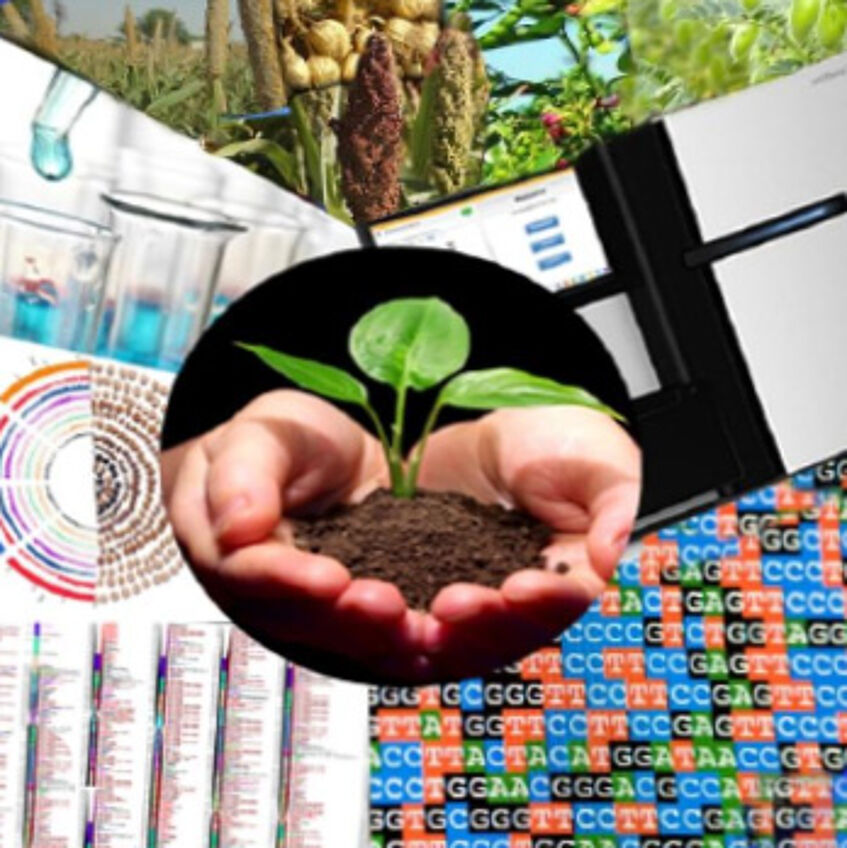Green Systems Biology

Green Systems Biology
- for details see: Green systems biology - From single genomes, proteomes and metabolomes to ecosystems research and biotechnology. Weckwerth W. J Proteomics. 2011 Jul 23. ... Abstract Pubmed
Plants have shaped our human life form from the outset. With the emerging recognition of world population feeding, global climate change and limited energy resources with fossil fuels, the relevance of plant biology and biotechnology is becoming dramatically important.
The problematic use of nutritional crops for biomass and biofuels
One key issue is the development of CO(2)-neutral plant resources for fiber/biomass and biofuels.
Core research questions should include the rapid substitution of nutritional crops (rapeseed, sugar cane, sugar beet, maize, wheat etc.) used for biofuel production by energy crops (grasses, trees, others) and algae which are already naturally designed for highly efficient biomass production as well as highly efficient CO2 fixation.
This process, which is as pressing as any question in biomedical research — or may be even more relevant for our future life on earth, will address the following socio-economic problems:
- Food market price is directly influenced by using food crops for biofuel production, especially a problem for developing countries
- Global climate changes, use of algae for biofuels would diminish the competition for arable land, competition for arable land otherwise leads to a rapid deforestation and soil erosion processes
- “Land grabbing” in developing countries by industrialized countries, irrational agricultural use of arable land.
- Financial market situation, after IMMO bubble now the next “Land Grab and Food Market" bubble.
- Healthy balance between public and private sector in AGBIOTECH
Dealing with less land and more stress while conserving biodiversity
Another aspect is to improve plant productivity and abiotic/biotic stress resistance in agriculture due to restricted land area and increasing environmental pressures.
At the same time we have to conserve and protect natural diversity and species richness as a foundation of our life on earth. Here, biodiversity banks are discussed as a foundation of current and future plant breeding research.
Understanding organisms at a systems level
Consequently, it can be anticipated that plant biology and ecology will have more indispensable future roles in all socio-economic aspects of our life than ever before. We therefore need
- an in-depth understanding of the physiology of single plant species for practical applications
- as well as the translation of this knowledge into complex natural as well as anthropogenic ecosystems
Latest developments in biological and bioanalytical research will lead into a paradigm shift towards trying to understand organisms at a systems level and in their ecosystemic context:
(i) shotgun and next-generation genome sequencing, gene reconstruction and annotation,
(ii) genome-scale molecular analysis using OMICS technologies and
(iii) computer-assisted analysis, modeling and interpretation of biological data.

Systems biology combines these molecular data, genetic evolution, environmental cues and species interaction with the understanding, modeling and prediction of active biochemical networks up to whole species populations. This process relies on the development of new technologies for the analysis of molecular data, especially genomics, metabolomics and proteomics data. The ambitious aim of these non-targeted 'omic' technologies is to extend our understanding beyond the analysis of separated parts of the system, in contrast to traditional reductionistic hypothesis-driven approaches.
The consequent integration of genotyping, pheno/morphotyping and the analysis of the molecular phenotype using metabolomics, proteomics and transcriptomics will reveal a novel understanding of plant metabolism and its interaction with the environment.
The analysis of single model systems - plants, animals and bacteria - will finally emerge in the analysis of populations of plants and other organisms and their adaptation to the ecological niche. In parallel, this novel understanding of ecophysiology will translate into knowledge-based approaches in crop plant biotechnology and marker- or genome-assisted breeding approaches.
In this review the foundations of green systems biology are described and applications in ecosystems research are presented. Knowledge exchange of ecosystems research and green biotechnology merging into green systems biology is anticipated based on the principles of natural variation, biodiversity and the genotype-phenotype environment relationship as the fundamental drivers of ecology and evolution.

